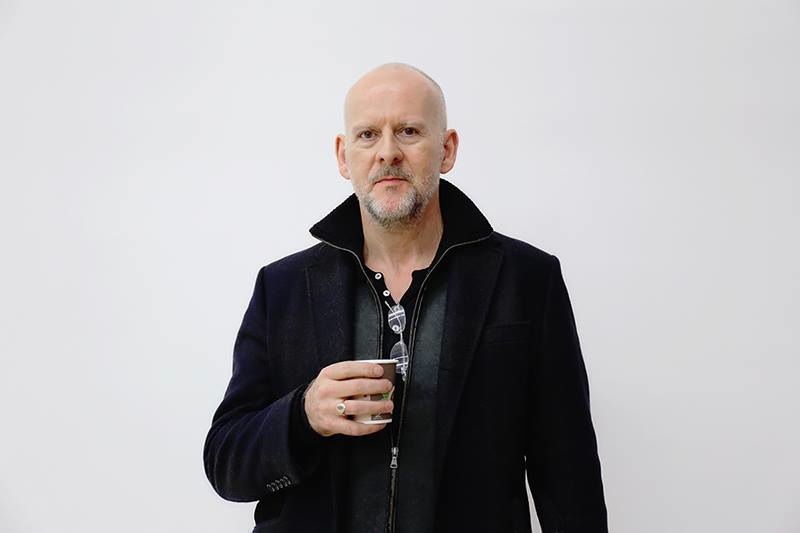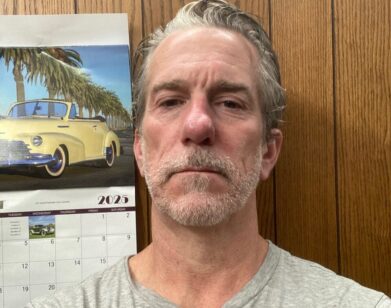The Man Who Sold the Underworld

ABOVE: SIMON CRITCHLEY
In his surprising new book, Bowie, bestselling philosopher Simon Critchley reappraises David Bowie, concluding that he’s less a pop star than an artist. Spinning stories of England’s music scene that draw on his own adolescence, Critchley is a sympathetic and astute observer. He finds new richness, darkness and complexity in Bowie’s methods.
The book blends memoir, philosophy, and criticism to create an unusual document that propels the reader through Bowie’s insect-like metamorphoses, from folksinger to glam rocker to avant-garde bard. He probes the singer’s literary and artistic influences, revealing a person of considerable curiosity, wit and discipline.
As he sipped spiked coffee in his book-lined office, Critchley described Bowie’s initial reception. He was already a mainstream hit-maker by the time he toured the U.S., but in the U.K. he’d operated as a provocateur who sent up rigid social class and gender norms. His first audiences were blue-collar teenagers responding to an unorthodox marriage of Dada, surrealism, and pop. They sparked an insurrection that dispensed with earnest ’60s rock. Bowie is an intelligent love letter to our imaginary friend—and it makes a persuasive case for the musician as a figure of lasting influence.
LISA DIERBECK: How did the book come about?
SIMON CRITCHLEY: I’d been wanting to do something on Bowie one day. I wrote it in a two-week blast last year. I’d had surgery for a badly fractured shoulder. I fell down some stairs. Eleven months of physical therapy, and I couldn’t write. I was basically in bed. On painkillers. At the end of August, I sat at my desk, and it just poured out. I thought about the cut-up technique in Bowie and in Burroughs. I’d had this linear structure, and I thought, “Why am I doing it this way? Why don’t I just jump-cut the whole thing?”
DIERBECK: Tell me more about the jump-cut technique as it applies to Bowie.
CRITCHLEY: William Burroughs meets Bowie in 1973, for an interview. Bowie had read Burroughs. He’s someone who just read constantly and voluminously and that’s never stopped. It’s another thing that makes him so interesting. He begins to introduce the cut-up technique into his lyrics. In Diamond Dogs, ’74, you’ve got bits of cut-up. Mostly, the songs tell stories. Bowie has this idea of doing a musical of 1984, Orwell’s book, and then to put it on the stage, but he couldn’t get the rights from the family, and the project failed. Diamond Dogs was the effect of that. Then he goes into a Los Angeles, cocaine-induced paranoid state, which he emerges from. Low is the album that has been most obviously cut up. I think there are 410 words in Low. It’s tiny. Stripped down. Imagistic. I think about that in the same way I think about Ezra Pound’s “In a Station of the Metro.” He’s on the subway, and he looks at the faces and they’re like petals on a black branch. Just these short lines which are oblique. You fill the rest in. All the songs, since then, have been these suggestive, compressed, imagistic sequences—where he’s not telling a story.
DIERBECK: The book talks about narrative unity. Can you explain?
CRITCHLEY: There’s this view that the unity of your life is the unity of the story you tell about your life. The President of the United States, Barack Obama, is the narrative arc he constructed in his book. And I think that’s bullshit. There are no narrative arcs. Human beings can tell those stories, but they’re not true. Identity is more of a series of blips. Bowie’s songwriting technique was like those episodic blips. A big axe grinding in the book is against the idea of narrative unity, and against the idea of authenticity. We had an idea of music, particularly in the U.S., as having an authentic quality—coming out of an experience of struggle or suffering, of historical oppression, or of musical ability. You get a cabin, you go live for four years in upstate Wisconsin, and come back with a 40-minute album. And everyone goes, “Wow, it feels really real.” Again, that’s all a horrendous lie. It’s not that some music is inauthentic. It’s the Warholian aesthetic: “Andy Warhol, silver screen. Can’t tell them apart at all.” Warhol said: “Before I was shot, I suspected life was like television. After I was shot, I was certain.” We’re living in illusions. Images. Ever inauthentic circles. That’s where culture happens. It doesn’t mean it’s not true, or that it’s irrelevant. On the contrary. To try to cut the cord between inauthenticity and truth is impossible. Bowie is the pop star who mobilizes illusions. It’s all he’s ever done. I suppose it becomes the model for all pop culture.
DIERBECK: So you think he’s very influential.
CRITCHLEY: Yeah. The grandest claim I make in the book happened to me. The ’60s were apparently great. No turn un-stoned, and all of that. Bowie is in that world, on the edges of that, and what he’s saying doesn’t seem to fit. He has no commercial success. In the early ’70s in Britain, there’s a turn away from the ’60s emancipatory, revolutionary idea of music: we can change the world, and all be together. Bowie has a very dystopian vision of things, which just begins to resonate and to offer an extraordinary, glamorous and androgynous alternative. There’s this dystopian moment in the early ’70s and everything that happens after that—glam, punk, post-punk, Goth, all those movements—are all consequences of that. I think we’re still living in that dystopian world. There’s this great song, “All the Young Dudes,” which Bowie wrote, but it was performed by Mott the Hoople.
DIERBECK: Before Bowie was a big star?
CRITCHLEY: Just after. There’s a line, “My brother’s at home with his Beatles and his Stones. I never got off on that revolution stuff. What a drag, too many snags.” There’s a real sense in which that had gone. And Bowie’s appeal was very much a working-class appeal. People who were turned on by Bowie weren’t people who went to college. There’s a rather bad film about Joy Division called Control. You see the young Ian Curtis in some shit-hole place, in his bedroom. He’s looking in the mirror. Putting on mascara. Smoking cigarettes. And listening to Diamond Dogs. It was like that. It was those people who were disaffected. It’s an ugly, shitty, low-fi world. Bowie offered just something else. So there’s a post-revolutionary dimension. There’s a class dimension. And, also, you can think about the American reception of Bowie and how different it is. In the ’70s in the U.S., things were going quite well. Going quite badly, in another way. Whereas in Britain, the shit really hit the fan.
DIERBECK: Economically?
CRITCHLEY: Economically. So in 1975, the finance minister goes to the IMF and he has to borrow money. Britain is this bankrupt country that has to borrow money from this international organization. There’s a real sense of shame around that. But that sense of everything just being screwed and eviscerated was the great context of the music. That’s why punk worked in Britain. Because nihilism was all around you. And Bowie embodied something. In the ’70s, most of the huge stars, they went out of fashion, the Beatles and the Stones, obviously, everybody did. Or, there were bands that were cool for a little bit, and then became pompous idiots. Bowie remained cool. It’s amazing.
DIERBECK: Bowie had a real punk ethos, you’re saying?
CRITCHLEY: The three obvious influences are MC5, Iggy and The Stooges, and The Velvet Underground. Everything else really is Bowie. It was the excessive mannerism, and the musical theater side to Bowie, and those bands. Punk was an elaboration of that. Sixties people were irrelevant. They were wankers. They didn’t know anything. They were idiots. This was for us. And the world was horrible and gray, and cramped and shitty and dull, and we were bored and angry. And there was this music which made you feel… something else. There’s a sexual side. There’s this book called The Joy of Sex, by Alex Comfort, an anarchist, and actually a very interesting figure. The illustrations are of men with beards and all this hair. This was “authentic,” hairy hippy sex. That’s a ’60s moment of sex. When Bowie turns up, you’ve got this androgynous, boy-girl, what is he. Hairless, with great hair. The image that really hit a lot of us was when Bowie was cast in The Man Who Fell to Earth, by Nicholas Roeg, in 1975. Basically, he doesn’t act. He’s just playing himself. There’s a certain point where he reveals his alien identity. He takes off his nipples and his eyelids and he lies on the bed. Candy Clark [his co-star] is appalled. She tries, but she’s disgusted. That, as an image of sexuality. It’s icy, alien, distant. Violent. And deeply ambiguous. Somehow, in a very straightforwardly heterosexist culture like the one we had in Britain, Bowie spoke to boys and girls. A desire was animated by this. Sex became something else. There’s this line in Diamond Dogs where he says, it’s “putting pain in a stranger.” He became a lightning rod of suggestive sexuality. It’s a darker, and much more macabre, view of sex.
BOWIE IS OUT NOW. A RELATED EXHIBITION, DAVID BOWIE IS, IS ON VIEW AT MCA CHICAGO THROUGH JANUARY 4.






